
Role of Women in Public Policy
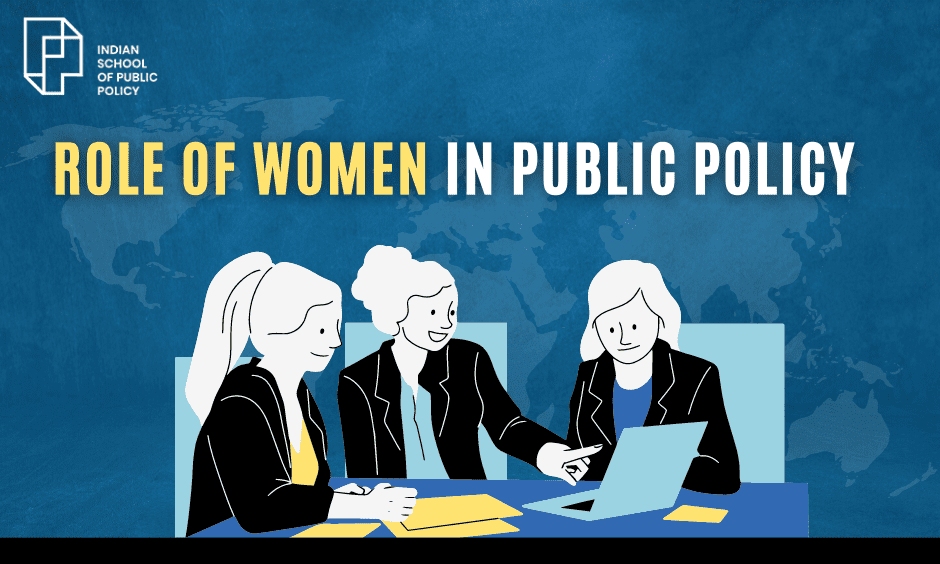
Women play a wide range of roles – loving daughters, reliable sisters, caring mothers, and accomplished colleagues. And you know what the most beautiful part is? They fit the bill perfectly in every role! It is a superpower they’re born with! This is now being recognised by the world as women are successfully leading in all spheres of life. They are known to wear multiple hats effortlessly EVERY SINGLE DAY, making them the backbone of every society.
Reference – https://hindrise.org/resources/women-empowerment-in-india-and-its-importance
Women empowerment has proved to be one of the most effective tools for development in India, and companies have begun altering their policies to accommodate more females in the workforce. In an analysis carried out by Deloitte covering 132 companies, the number of women on boards has increased by 4.7% to 12.4% in India, in the past two years. The Companies Act that was approved in August 2013 made it mandatory for all listed companies to appoint at least one woman director onboard. The Securities and Exchange Board of India (Sebi) also revised its disclosure to include a similar provision. The 5th edition of Deloitte Global’s Women in the Boardroom explores the efforts of over 60 countries to promote boardroom gender diversity.
Female Stalwarts
Women Entrepreneurship Platform, is a unique public-private partnership initiative by NITI Aayog to help scale up the efforts towards women empowerment by promoting female entrepreneurship. The platform celebrates the female stalwarts who have contributed towards the Sashakt aur Samarth Bharat through their efforts towards building a conducive ecosystem and representing the new, bold India. Here are some inspiring entrepreneurs working relentlessly towards the development of the country.

Hardika Shah
Founder & Chief Executive Officer (CEO)
Kinara Capital
Bengaluru, Karnataka
Vision – A financially inclusive world providing every entrepreneur equal access to capital.
Hardika Shah decided to support underserved entrepreneurs by launching Kinara Capital disrupting small business lending in India. Under her leadership, Kinara is advancing financial inclusion in the MSME sector leading to the generation of INR 700 crores in incremental income, and has also supported 250,000+ jobs in local economies.
With AI/ML data-driven credit decisions, their flagship “myKinara” app guarantees 24-hour disbursements while the “HerVikas” programme grants women entrepreneurs an automatic discount.

Dr. Radhika Batra
Founder and President
Every Infant Matters
New Delhi
Vision – Fighting Malnutrition and Preventing Health Inequalities Worldwide
Dr. Radhika Batra, launched a holistic health programme empowering women, promoting breastfeeding, deworming, immunisation, and dispelling harmful myths. Currently in India, Dominican Republic, Kenya, and Nigeria, teams of Every Infant Matters are serving disadvantaged women and children by providing them access to last-mile health solutions. Their COVID-19 Task Force was also available and assisted approximately 33,000 patients to get admissions, ventilator beds, and even lifesaving surgeries. Justice and inclusion are the principles of the programme, and the entire team works towards promoting gender equality.

Priti Patel
Chairperson and Managing Director
Raspian Enterprises Pvt. Ltd.
Rajkot, Gujarat
Vision – Empowering and Encouraging Women to Actively Participate in the Defence Sector
Established to manufacture state-of-the-art Small Arms Weapon Systems and Security & Defence Products, Raspian Enterprises caters to Indian and Global defence requirements unrivaled in quality, reliability, and cost efficiency. She leads a team of experts working on product improvements, focused primarily on indigenisation of the latest technologies. She envisions the women of India participating actively in the Defence and Security sector.
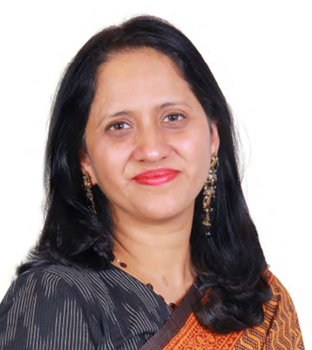
Anuradha Parekh
Co-Founder
The Better India
Bengaluru, Karnataka
Vision – Inspiring a Billion Lives with Stories of Hope, Courage and Initiative
Anuradha Parekh has managed to influence millions to contribute to the solution instead of the problem. Her initiative ‘The Better India’ generates awareness, and gives hope empowering the readers to become changemakers in their own unique ways. It shares inspiring stories that influenced government policies positively, helped farmers overcome poverty, helped urban slum schools acquire funds, and introduced the concept of water and sanitation in villages, to name a few. Anuradha’s ‘The Better India’ initiative has not only challenged the media landscape but also changed the narrative from demotivation and despair, to inspiring and action-oriented.

Prema Gopalan
Founder
Swayam Shikshan Prayog
Pune, Maharashtra
Vision – Promoting Sustainable Development, Empowering Women’s collectives.
Swayam Shikshan Prayog, founded to empower the grassroots women’s communities across Kerala, Bihar, Maharashtra, and Odisha has empowered over 300,000 rural women as entrepreneurs and change makers. Resilient communities across 7 climate-hit States are being built in India, positively impacting a population of over 6M. Over 150,000 rural women under her guidance, have been repositioned as climate-adaptive farmers who have also been given the authority to make decisions regarding land rights and incomes.
In India, the participation of women in politics has also increased significantly over the years, from contesting elections in the 1970s to today, these change-makers hold key positions in the government, making a positive impact on the country’s policy-making process and strengthening its power. Schools such as the Indian School of Public Policy (ISPP), as the name suggests, specialising in public policy have been launched, with a clear mission to empower young minds in driving meaningful societal progress.
Women of ISPP
Here are examples of exceptional women from ISPP who have achieved accolades in the field of public policy.
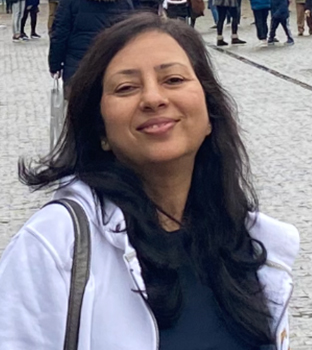
Dr. Sangeeta Bansal
Professor of Economics, Jawaharlal Nehru University
Specialisation – Environment
Sangeeta Bansal, a PhD in Economics from the Indian Statistical Institute in 2003, has been a professor in Economics at Jawaharlal Nehru University (JNU), New Delhi since 2010. Prior to that, she served as an associate professor at JNU from 2004 to 2009. Her research focuses on environment and development economics, specifically in the field of modeling green consumerism using game theoretic tools.
Recently, she conducted an evaluation of new seed technologies in Indian agriculture and examined consumer and farmer behavior towards these innovations. Her research employed lab experiments and discrete choice experiments to analyse these dynamics. Additionally, she has conducted studies on labeling policies related to the environment and genetically modified crops.
Sangeeta Bansal actively contributes to the academic community as an associate editor of Resource and Energy Economics and serves as an editorial board member of Environment and Development Economics. In recognition of her expertise, she was awarded the Fulbright-Nehru Senior Research Fellowship for 2013-14, which allowed her to visit the University of California, Berkeley.
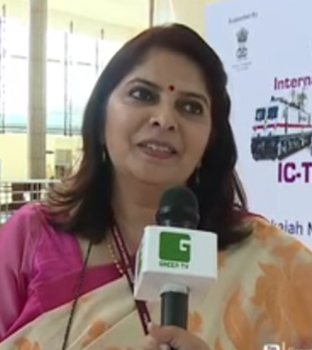
Kalpana Dube
Ex-Indian Railways, NAIR
Specialisation – Infrastructure
An esteemed officer of the Indian Railways Accounts Service (IRAS), Dr. Kalpana Dube, has had a distinguished career in Financial Management within the Indian Railways. She was among the rare women in the country to hold a professional management degree – an MBA from the University of Lucknow in 1982. Subsequently, she pursued and completed her PhD in Public Policy at the Jamnalal Bajaj Institute of Management Studies (JBIMS) at the University of Mumbai.
While Dr. Dube implemented a significant Indo-German project for costing of passenger coach services and workflow systems, her exceptional work was recognised at the national level, as she was shortlisted for the Hubert Humphrey Fulbright Fellowship. With 38 years of extensive administrative experience, she has also nurtured a lifelong dedication to teaching and training. Dr. Dube imparted her expertise to IAS probationers at the prestigious Lal Bahadur Shastri National Academy of Administration (LBSNAA) in Mussoorie. Her remarkable commitment and diligence led her to be awarded the esteemed Erasmus Mundus Teaching Fellowship, where she taught Public Policy to postgraduate students at the University of Yorkshire, UK. Additionally, she served as the Chief of the Faculty of Finance at the National Academy of Indian Railways in Vadodara, Gujarat.

Dr. Archana Gulati
Specialisation – Technology
Dr. Gulati is a seasoned expert with over 31 years of experience in the fields of telecom, technology, and competition policy. She began her career as an Indian Civil Services officer (1989 batch) and voluntarily retired in 2021. Following that, she served as a Senior Adviser on competition law and was heading Public Policy at Google India until October 2022.
Dr. Gulati holds a BA Honours in Economics from Lady Sri Ram College, Delhi University, an LLM in Telecom & IT law from the University of Strathclyde, UK, and a Ph.D. from the Indian Institute of Technology, Delhi.
Passionate about the transformative potential of digital communications and technologies, Dr. Gulati has consistently worked towards formulating policies and implementing projects that promote Universal Service. She firmly believes that regulations and business practices fostering consumer safety and trust is crucial for the universal acceptance, adoption, and realisation of technology’s potential, and has actively put this philosophy into action throughout her roles in the Indian Government. Her recent positions include Advisor (Digital Communications) at the National Institute for Transforming India.
Previously, as the Senior Deputy Director-General in the Department of Telecommunications, she served as Officer on Special Duty (OSD) to the Chairperson of the Telecom Commission of India. Dr. Gulati has also led the M&A wing of the Competition Commission of India and served as the Financial Advisor to the Chairperson of India’s National Disaster Management Authority.
She has been an expert with the International Telecommunication Union (ITU), where she served as the Co-rapporteur of the ITU-Development sector’s Study Group (2018-21), focusing on Consumer Protection in the Digital Age. Representing the Asia Pacific Region, she also held the position of Vice-Chair of the ITU Working Group on Finance and Human Resources.

Dr. Archana Gulati
Head HR & Capacity Building, ASER Centre
Nandita Banerjee has been working in the non-profit sector for the last 15 years. She has worked with Help Age India, Dignity Foundation, and the National University of Singapore dealing with issues of ageing. She works with Pratham at ASER Centre with the Capacity Building Team to strengthen the knowledge and skills of the employees. She has received training from the International Institute of Ageing in Malta, World Bank, New Delhi.

Jessica Seddon
Senior Fellow
Jessica Seddon’s work on environmental governance focuses on how new sources of data can be leveraged to enable new (and more sustainable) ways of interacting with the environment around us. Her career in India and the U.S. spans academic, program leadership, and strategic advisory roles focused on institutional design for integrating science into policy and social initiatives. Seddon is a co-founder of The Institutional Architecture Lab (TIAL) and Senior Fellow at Artha Global, a networked policy consulting organization that supports governments in the developing world to design, implement, and institutionalize policy frameworks that promote prosperity, stability, and resilience. She is also an Adjunct Fellow with the Chair in U.S.-India Studies at the Center for Strategic and International Studies (CSIS) and serves on the academic council of the Indian School of Public Policy in New Delhi.
Post Graduate Programme in Public Policy, Design and Management
ISPP’s programme is for those looking to make an impact in the public policy sphere. Let’s understand the programme in detail!
The flagship one-year programme trains public policy enthusiasts in the science of policymaking by offering –
HARRIS UCHICAGO: CERTIFICATE IN PUBLIC POLICY – offers ISPP scholars a Certificate in International Development and Public Policy upon successful completion of the programme.
IMMERSIVE LEARNING PROJECTS – High-impact learning experiences for the students at ISPP to collaborate on projects in real-time, and are guided by project leads from client organisations.
INTERACTIVE LABS – That include –
- Writing and Communication Lab: develop scholars’ verbal, non-verbal, and writing skills to effectively communicate in development, corporate, and academic settings.
- Antarang Leadership Lab (ALL): An experiential lab that aims to make the scholars more aware of themselves and build their leadership skills.
- Quant Lab: Equips scholars with data-handling tools in Excel including data analysis and data visualisation.
CAREER SUPPORT & PLACEMENTS – Trains future leaders rigorously in management, communication, and leadership skills.
TEA & POLICY – A unique initiative where we invite public policy professionals from a diverse range of industry backgrounds to engage with scholars.
Eligibility Criteria
- Any candidates who have successfully completed undergraduate studies regardless of discipline, from an Indian or International University
- Applicants enrolled in the final year of their undergraduate studies are eligible too, however, they must successfully complete all requirements of their undergraduate studies before the commencement of the programme at ISPP.
- Students with prior work experience in relevant domains (not mandatory for exceptional candidates)
- Applicants are not expected to possess any prior specific skills, background, or technical experience other than numerical literacy and language proficiency.
- Curricular and extracurricular activities undertaken by applicants in order to evaluate their excellence and commitment.
- Scholar’s ability to work collaboratively, communication skills, humility adaptability, and aptitude for leadership are some of the key characteristics of an ideal ISPP Scholar.
Student Success Stories
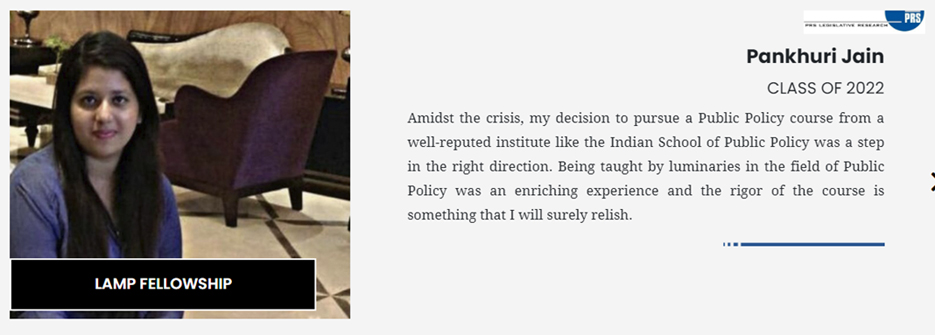

Register your Interest to Study at ISPP
Check Infographics



